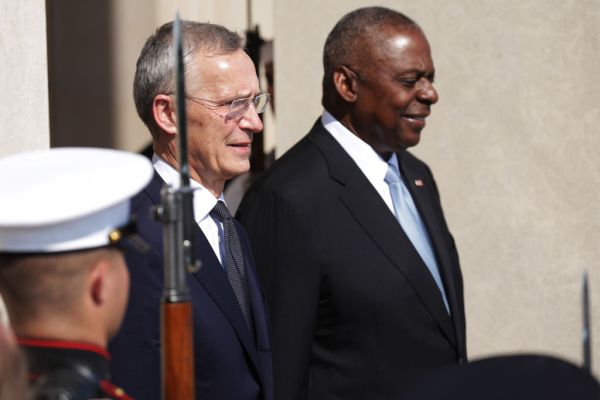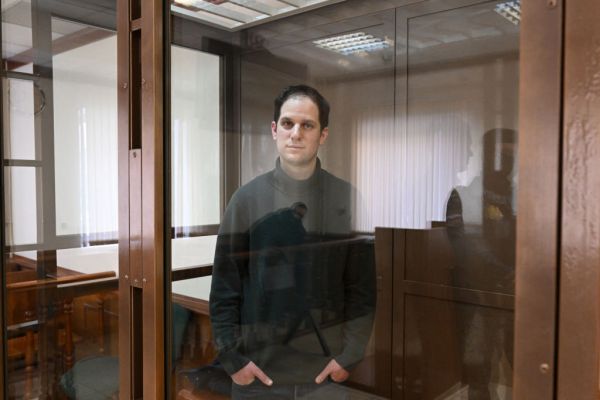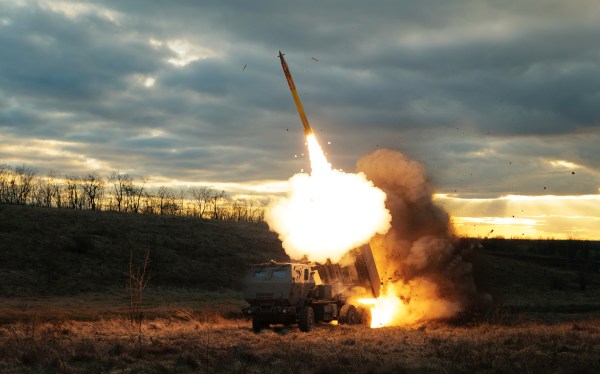U.S. efforts to counter Russian propaganda focus almost exclusively on defense: The government is forced to shore up the integrity of our elections and combat disinformation on social media. But there is a different propaganda war the Kremlin is waging against the West (as well as its own people), parallel to its shooting war with Ukraine: It has long weaponized what it calls “traditional spiritual and moral values.” At home, Vladimir Putin aims to ensure the security of his regime and justify its aggressive censorship and revanchism. Globally, Moscow seeks to promote Russian influence, forge alliances with like-minded actors, and stoke divisive culture wars in the West. It’s a campaign the U.S. cannot afford to ignore anymore than it could ignore the invasion of Ukraine.
Spiritual-moral values: securing regime control.
Russia’s efforts to promote traditional spiritual and moral values—“patriotism and unity” but also cultural conservatism and opposition to LGBT rights—go back decades. The Kremlin released its National Security Concept of 2000 just days after Putin assumed the Russian presidency, stressing a connection between national security and these values. Most recently, Russia’s Foreign Policy Concept of 2023, adopted on March 31, identifies “strengthening traditional Russian spiritual and moral values and preserving the cultural and historical heritage of the multinational people of Russia’” as key national security interests.
Putin casts his efforts as a vital defense against Western efforts to subvert Russian society. He accused the West of seeking “to destroy our traditional values and force on us their false values that would erode us, our people from within” in his speech announcing the invasion of Ukraine. Such messaging allows him to shore up the security of his own regime while also legitimizing state censorship against Western and independent Russian media sources of information.
Russia has only intensified its traditional values campaign, along with a broader crackdown on free speech since then. In November 2022, Putin issued a decree directing his regime to redouble its efforts to preserve and strengthen “traditional Russian spiritual and moral values.” Russian internet and media regulator Roskomnadzor has announced a program to inculcate Russian youth with “the values of patriotism and unity” through “patriotic education” and regime-friendly content.
Anti-LGBTQ discrimination has long been a central focus of this campaign. In 2013, Russia passed a law that imposed fines for holding pride parades or distributing “propaganda of nontraditional sexual relations” to minors. Last December, Russia expanded that law, stiffening the penalties and banning LGTBQ “propaganda” in any form, including for adults. Putin signed that bill days after an expanded “foreign agents” law, designed to suppress political dissent and independent media, came into effect.
The Russian Orthodox Church plays a key role in the Kremlin’s efforts. Patriarch Kirill, who’s led the Russian Orthodox Church since 2009, has condemned same-sex marriage as “a sign of the apocalypse.” He’s close to conservative factions in the Russian parliament and meets with Putin regularly.
Putin has used religious propaganda to legitimize his imperialistic pursuits within the so-called Russkiy Mir, or “Russian world.” After illegally annexing Crimea in 2014, a triumphant Putin stressed the peninsula’s “invaluable civilizational and even sacral importance” as the place where “Grand Prince Vladimir was baptized before bringing Christianity to Rus.” Days before the 2022 invasion of Ukraine, Putin argued Russia had to prevent the “destruction” of the pro-Russia faction of the Ukrainian Orthodox Church. Kirill enthusiastically threw his support behind the war. He’s even blamed the conflict on gay pride parades, claiming the war is about “a fundamental rejection of the so-called values that are offered today” by the West.
Weaponizing ‘traditional values’ abroad.
“Traditional values” are an important part of Moscow’s soft power and information operations both in Russia’s near abroad and farther afield. In a 2013 speech, Putin cast Russia as a defender of conservative values in the international arena, arguing that the West’s alleged efforts to impose its values on foreign countries lead to “regression” and “bloodshed” rather than progress.
As with the Kremlin’s domestic propaganda, the Russian Orthodox Church performs a key role in Russia’s foreign-facing efforts. The church not only legitimizes the Kremlin’s self-appointed role as the defender of Russian Orthodox civilization, but it also plays an active part in advancing Moscow’s influence abroad. The European Parliament recently highlighted how “Russia builds links within” in Orthodox countries through church activities coordinated with the Russian government. Wealthy Russian businessmen similarly use their resources to cultivate religious ties abroad and push Kremlin propaganda.
In Western countries without a strong Orthodox presence, Moscow has sought to infiltrate and build alliances with sympathetic religious and social institutions, working through institutions such as the World Congress of Families, which brings together various European Christian organizations and U.S. Evangelical groups. Russian messaging casts Moscow and Western Christian institutions as allies in the fight to uphold cultural conservatism. These efforts have clearly resonated among certain right-wing groups: Far-right French politician Marine Le Pen, for example, has praised Putin for standing up for traditional values.
But Moscow isn’t just building alliances. It also works to destabilize and distract the West by fanning the flames of divisive culture wars. In the United States, Russian information operations promote polarizing rhetoric, often amplifying conservative accusations that the left seeks the destruction of the traditional family.
In February, retired Lt. Gen. Michael Flynn, who briefly served as national security adviser under President Donald Trump, publicly praised Putin’s defense of “the family and God,” which Flynn called “strong values the West is destroying.”
What should the U.S. do?
Playing defense is not enough. Washington should adopt an offensive approach that would force Moscow to spend time and resources countering U.S. information campaigns rather than on destabilizing the West. It would also help regain ground in places vulnerable to Russian propaganda, such as the Balkans and the global South. Fortunately, the United States need not emulate Russian disinformation tactics to achieve success: The truth is on America’s side.
U.S. information operations don’t need to sell liberal values to ordinary Russians—appealing to Russian nationalism would be more effective, and exposing Kremlin hypocrisy is a good place to start. Putin claims the West is “satanic” in its rejection of “moral norms,” but Russia has one of the highest abortion rates in the world. The Russian Orthodox Church staunchly opposes abortion, yet Putin has never introduced any legislation to restrict it.
Likewise, while Putin argues for the importance of preserving the nuclear family, divorce rates are increasing in Russia. Annual divorce rates grew by 44 percent in 2021, reaching a seven-year high. Ironically, Russia’s divorce rate is 2.5 times higher than that of the supposedly immoral European Union. Domestic violence and other moral ills run rampant in Russia. From 2011 to 2019, 65 percent of women murdered in Russia were domestic violence victims, according to a study by the Russian Consortium of Women’s Non-Governmental Organizations.
The Russian Orthodox Church is another easy target. Both before and during Putin’s reign, Patriarch Kirill and other church leaders have amassed enormous wealth through corruption. A 2020 investigation identified nine properties throughout Russia owned by or linked to Kirill, valued at millions of dollars.
Satire and humor are useful tools in countering Russian propaganda, and Putin’s personal life offers plenty of fodder. The Russian leader and his longtime girlfriend, gymnast Alina Kabaeva, began their affair when he was still married to his first wife. Putin is believed to have fathered a number of children out of wedlock, both with Kabaeva and with other women.
The Putin regime is waging a spiritual war to repress the Russian people and destabilize foreign democracies. Now it’s Washington’s turn to flip the script.








Please note that we at The Dispatch hold ourselves, our work, and our commenters to a higher standard than other places on the internet. We welcome comments that foster genuine debate or discussion—including comments critical of us or our work—but responses that include ad hominem attacks on fellow Dispatch members or are intended to stoke fear and anger may be moderated.